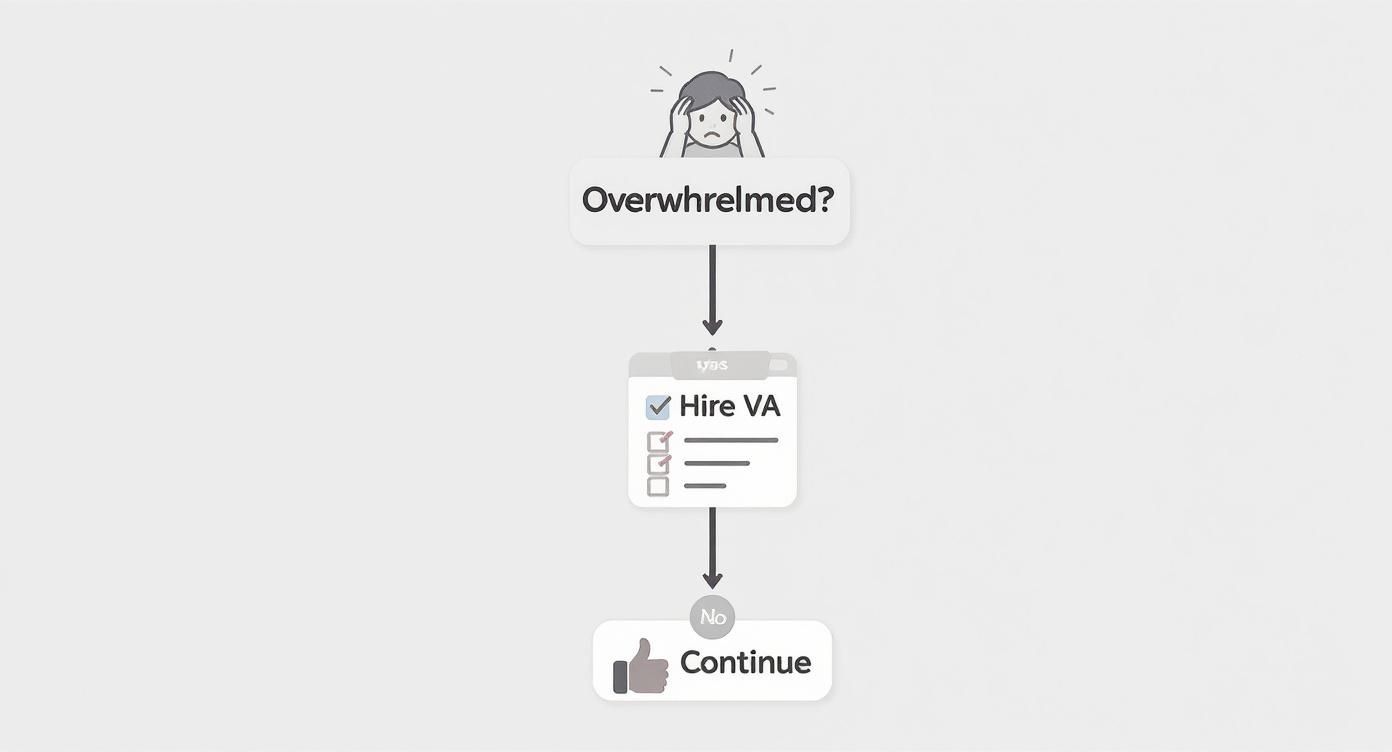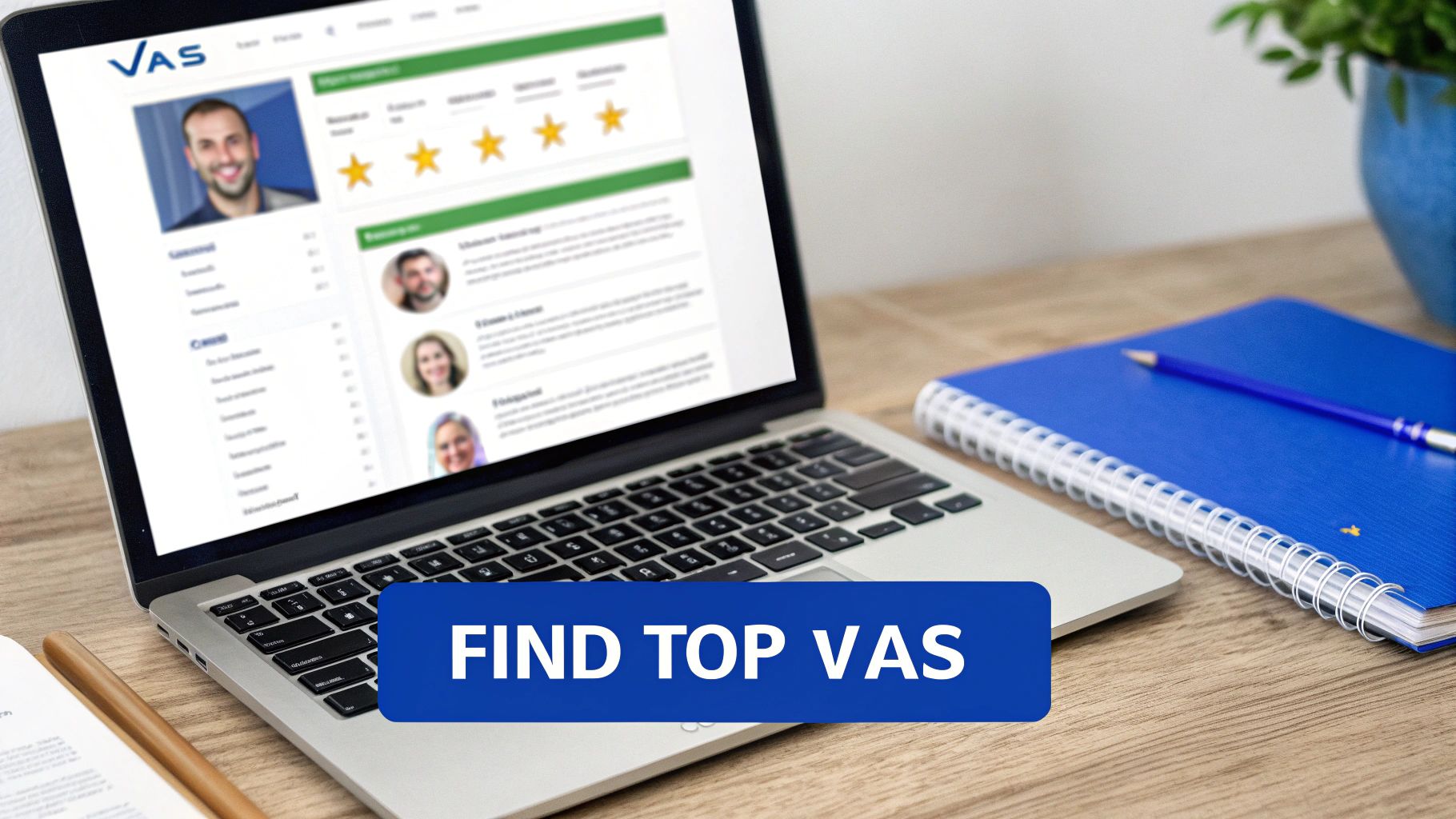Hiring a virtual assistant is one of the smartest strategic investments you can make in your business. It’s not about finding cheap labour; it’s about buying back your most valuable asset: your time. For entrepreneurs across the UK, this is the key to reclaiming focus, offloading the administrative drag, and finally creating the mental space you need for genuine growth.
Think of it as the decisive step away from working in your business to working on it.
Why Smart UK Businesses Are Hiring Virtual Assistants
The way we work has changed for good. Remote teams and digital collaboration aren't just trendy anymore; they're the foundation of any agile, modern business. Yet, for so many UK entrepreneurs, the daily grind is a real bottleneck. You know the drill: chaotic inboxes, endless meeting scheduling, and mind-numbing data entry.
This administrative burden quietly eats up hours that should be spent on what really matters—finding new clients, innovating your products, or mapping out your next big move.
Hiring a virtual assistant tackles this problem head-on. It’s less of a business expense and more of a powerful lever for growth, and the impact is almost immediate.
Reclaiming Your Calendar and Sanity
Picture this: you start your week, and your calendar is already organised, your inbox is sorted, and your top priorities are clearly laid out. This isn't some far-off dream; it's the day-to-day reality for business owners who learn to delegate effectively. A great VA takes ownership of all those repetitive, process-driven tasks that drain your energy.
This frees you up to concentrate on the high-level, strategic thinking that only you, as the founder, can do.
For instance, I’ve seen a marketing consultant hand off presentation formatting and lead follow-up emails to their VA. Just like that, they freed up an entire day each week to focus on strategy sessions with their highest-paying clients.
The real value of a VA isn’t just about the tasks they get done. It’s about the high-value opportunities you suddenly have the time and energy to chase.
A Strategic Move in a Growing Market
This isn't just a hunch; the numbers back it up. The UK virtual assistant services market is absolutely booming. Valued at USD 773 million, it’s projected to rocket to USD 4,336 million by 2030. This points to a massive shift in how businesses are being run, with more and more embracing flexible, skilled support to stay competitive.
You can dive deeper into the UK virtual assistant market and its projected growth to see the trend for yourself. This isn't simply outsourcing—it's about building a smarter, leaner, and more resilient business from the ground up.
Pinpointing What You Actually Need a VA to Do
Jumping onto a freelance platform without a clear mission is a classic mistake and a fast way to hire the wrong person. Before you even think about writing a job post, you need to get brutally honest about where your time is really going.
A simple ‘task audit’ is the perfect place to start. For just one week, track everything you do. Seriously, everything. Use a spreadsheet or even just a notepad and categorise each task into one of three buckets:
- Tasks only you can do (e.g., strategic planning, high-level client relationships).
- Tasks you absolutely dread doing (for me, it was always reconciling expenses).
- Tasks you’re simply not skilled at (like graphic design or social media management).
This simple exercise gives you a clear, data-driven list of responsibilities that are ripe for delegation.
Generalist vs Specialist Support
Once you have your list, a clear pattern will emerge. You'll see whether you need a generalist VA for broad support or a specialist with a specific skill set.
A generalist is your go-to for taking over a wide range of administrative duties. If you run an e-commerce store, this might be managing customer service emails, processing returns, and organising the daily shipping schedule. For a consultant, it could be managing their calendar, formatting presentations, and booking travel. They're the ultimate all-rounders.
A specialist, on the other hand, brings deep expertise in one area. Think of a social media VA who not only schedules your content but creates the entire strategy, or a bookkeeper who manages your invoicing and reconciles everything in Xero. Knowing which you need is half the battle.
To help you visualise this, here’s a breakdown of common tasks you might delegate.
Identifying Tasks to Delegate to a Virtual Assistant
This table should give you a solid starting point for mapping out the role and deciding on the level of expertise you're looking for.
Don’t just hire a VA to be "less busy." Hire them to take over specific, defined processes so you can focus on high-value, revenue-generating activities. This clarity prevents scope creep and ensures you see a tangible return on your investment.
This decision tree infographic really simplifies the choice of when to bring on a virtual assistant, especially when looking at your current workload.

As the guide shows, feeling consistently overwhelmed is a massive red flag that it's time to get some help on board.
With a well-defined list of tasks in hand, you’re ready to build a role description so specific it attracts the perfect candidates. For a deep dive, check out our guide on how to write job descriptions that actually work. A great description acts as your first filter, saving you countless hours by repelling unqualified applicants right from the start.
Finding and Vetting Top-Tier Virtual Assistants
Now that you have a clear idea of what you need help with, it's time to find the right person for the job. Knowing where to look when you want to hire a virtual assistant is half the battle, as different platforms cater to different needs and budgets. It pays to be strategic here rather than just posting a job ad and hoping for the best.

Popular freelance marketplaces like Upwork or Fiverr are brilliant for tapping into a huge global talent pool. They can be incredibly cost-effective, especially if you have a specific, one-off project. The downside? You might get buried in applications, and the entire screening process falls squarely on your shoulders.
If you’re looking for someone to become a more integrated, long-term part of your team, professional networks like LinkedIn are often a better bet. You get a much clearer picture of a candidate's work history and endorsements, giving you confidence in their professional background. It’s a great place to find seasoned professionals who aren't necessarily trawling job boards.
Then you have dedicated VA agencies. Yes, they cost more, but they do all the legwork for you. They pre-vet their assistants, handle the contracts, and will even find a replacement if your first match doesn't work out. This option can save you a massive amount of time and significantly lowers the risk of making a bad hire.
Put Them to the Test with a Trial Project
A CV tells you what someone has done. A trial project shows you how they do it. From my experience, the single most effective way to vet a potential VA is to give them a small, paid trial task. This isn't just a skills test; it’s a window into their communication style, attention to detail, and ability to follow instructions.
Pick a genuine, low-risk task from your list. Something like:
- A research task: "Could you research and compile a list of the top five CRM software options for a small UK-based consultancy? Please include pricing and key features in a spreadsheet."
- A scheduling task: "I need to meet with these two contacts. Here are three potential times. Please coordinate with them via email to find a slot that works and book it in my calendar."
- A content task: "Here’s a raw transcript from a meeting. Can you please format it into a clean, readable blog post draft in a Google Doc and highlight a few key quotes?"
The real insight comes not just from if they complete the task, but how. Did they ask smart, clarifying questions? Did they deliver it on time without you having to chase? Did they provide a quick summary with their work? This is how you spot a proactive partner, not just a task-doer.
By investing a small amount of money upfront in a trial, you get a real feel for their working style before you commit to anything long-term. This simple step can save you countless hours and a lot of headaches down the line.
Running an Interview That Reveals Real Talent
A great virtual assistant is so much more than a list of skills on a CV. If you want to find someone who will truly own their role, you need to toss out the standard interview script and learn how to see a candidate's real potential in action.
Stop asking tired questions like, “What are your biggest weaknesses?” Instead, shift your focus to scenario-based questions that reveal how a VA thinks on their feet. These aren’t trick questions. They’re designed to show you the soft skills that are absolutely essential for a successful remote role: proactivity, resourcefulness, and crystal-clear communication.
Moving Beyond The CV
It's one thing for a candidate to say they're a great problem-solver; it's another thing entirely to see their process unfold. Your job is to create that opportunity during the interview by putting them into a realistic work situation.
Try posing one of these scenarios:
- "Imagine you receive two high-priority tasks from me at the same time. How would you decide which one to tackle first?"
- "Walk me through how you'd get up to speed on a new software tool you’ve never used before for a critical project."
- "What steps would you take if you noticed a recurring error in a process you manage?"
Their answers tell you far more than just their technical skills. You get a glimpse into their approach to prioritisation, their initiative, and how they handle responsibility. This interview style is a key part of what is competency-based interviewing, a method specifically designed to predict future on-the-job performance.
This practical approach is especially vital for UK small and medium-sized businesses (SMBs), which have led the charge in hiring virtual assistants. In fact, SMBs are expected to capture 44.4% of the virtual assistant market, a trend fuelled by their need for staffing solutions that are both fast and cost-effective.
Pay close attention to the questions they ask you. A proactive candidate will want to understand your expectations, communication style, and how you measure success. In this case, silence isn't golden; curiosity is.
When you're ready to start interviewing, these 5 tips for a remote job interview can give you a great framework for the conversation. Ultimately, you're trying to spot the difference between someone who just follows instructions and someone who will become a truly indispensable partner to your business.
Setting Your New Virtual Assistant Up for Success
The contract is signed, but your work isn't done yet. In fact, a messy onboarding is one of the fastest ways to see a promising VA relationship fizzle out. That first week is absolutely crucial for setting the tone and building a productive, long-term partnership.

A smooth start all comes down to preparation. Before your VA even begins, put together a simple ‘Welcome Hub’. This doesn't need to be fancy—a Google Doc, a Notion page, or a Trello board works perfectly. The point is to create a central resource that stops those constant "Where do I find...?" questions that bring everything to a halt.
I always recommend including these essentials in your Welcome Hub:
- Essential Logins: Share credentials safely using a password manager like LastPass. Don't just email them.
- Key Contacts: A simple list of who’s who and who to ask for what.
- Brand Guidelines: Your logos, colour palettes, and especially your tone of voice guides are non-negotiable.
- Process Docs: If you have Standard Operating Procedures (SOPs) for recurring tasks, share them upfront.
Getting Communication and Expectations Right
Once your VA is on board, long-term success really boils down to how you manage the relationship. It's worth looking into proven strategies for managing remote teams successfully because they lay the groundwork for seamless collaboration from day one. This means setting the rules of engagement right away.
Don't just assume they know how you like to work. Be crystal clear about your expectations. Do you want a daily check-in on Slack every morning? Or would you prefer a quick summary email at the end of the day? Show them the ropes of your task management tool, whether it's Asana, Trello, or ClickUp, and walk them through your project workflow.
A great VA relationship is built on trust and clarity, not assumptions. Empower your assistant by clearly defining the scope of their autonomy. Let them know it's okay to make small, reversible decisions without seeking approval every time.
This foundation of trust is how a new hire transforms into a truly indispensable team member. All the time you put into a proper onboarding pays for itself tenfold. In my experience, UK entrepreneurs save an average of 12–14 hours per week by delegating well, which frees them up for the big-picture thinking that actually grows the business.
Ultimately, a structured start prevents confusion and helps your VA start delivering value much faster. For a deeper dive into getting your new hire up to speed, check out our guide on virtual assistant training, which covers everything from tool-specific tutorials to fostering proactive problem-solving skills.
Answering Your Lingering Questions About Hiring a VA
Even with the best-laid plans, a few nagging questions can make you pause before taking the leap. I get it. I’ve been there too. Let's walk through some of the most common sticking points I hear from business owners, so you can move forward with total confidence.
What's the Real Cost of a UK-Based Virtual Assistant?
This is usually the first thing people ask, and honestly, it depends. You get what you pay for. For general admin tasks, you might find a VA on a freelance platform for around £15-£25 an hour.
But what if you need more than just inbox management? If you're looking for someone with serious skills in digital marketing, bookkeeping, or managing complex projects, you'll need to budget for a specialist. In my experience, a skilled VA, especially one from a trusted agency, will typically cost between £30-£50+ per hour. Think of it as an investment – the budget should match the value and complexity of the work you need done.
How Can I Possibly Keep My Data Secure with a Remote Worker?
Handing over the keys to your business can feel like a huge leap of faith, but keeping your data safe is actually quite manageable if you set things up correctly from the start.
- Never share raw passwords. Instead, use a password manager like LastPass or 1Password. These tools let you grant access to specific accounts without ever handing over the actual login details. It’s a game-changer.
- Lock down your files. Cloud storage like Google Drive or Dropbox for Business is perfect for this. You can control exactly who sees and edits what, right down to the individual file.
- Get it in writing. Your contract absolutely must include a solid confidentiality clause or a separate non-disclosure agreement (NDA). It’s a non-negotiable part of the process.
Here's the golden rule I always follow: only grant access to what is absolutely necessary for the job. This "principle of least privilege" is your single best defence against any potential security headaches.
Should I Find Someone Myself or Go Through an Agency?
This really boils down to a classic trade-off: time versus money.
Hiring directly from platforms like LinkedIn or Upwork gives you access to a massive pool of talent and can certainly be cheaper. The catch? You're on the hook for everything – sifting through applications, conducting interviews, drawing up contracts, and handling all the onboarding. It's a significant time commitment.
On the other hand, using a UK-based VA agency costs more, but they do all the heavy lifting for you. They’ve already vetted their candidates, they handle the contracts, and many will even find you a replacement if the first person isn't the right fit. It saves you a ton of time and seriously lowers the risk of a bad hire.

